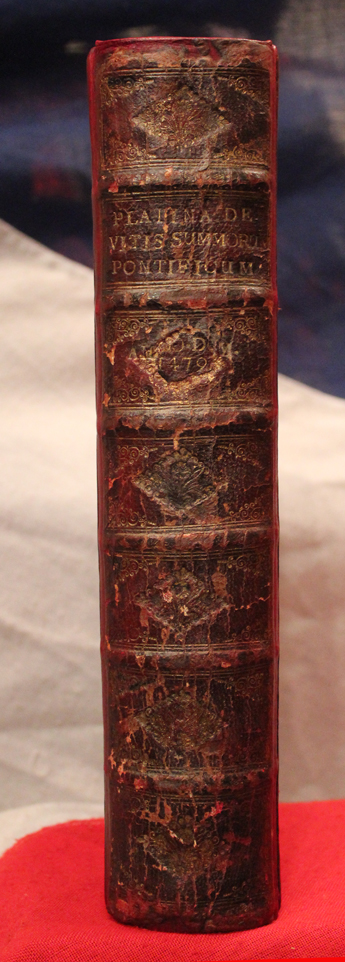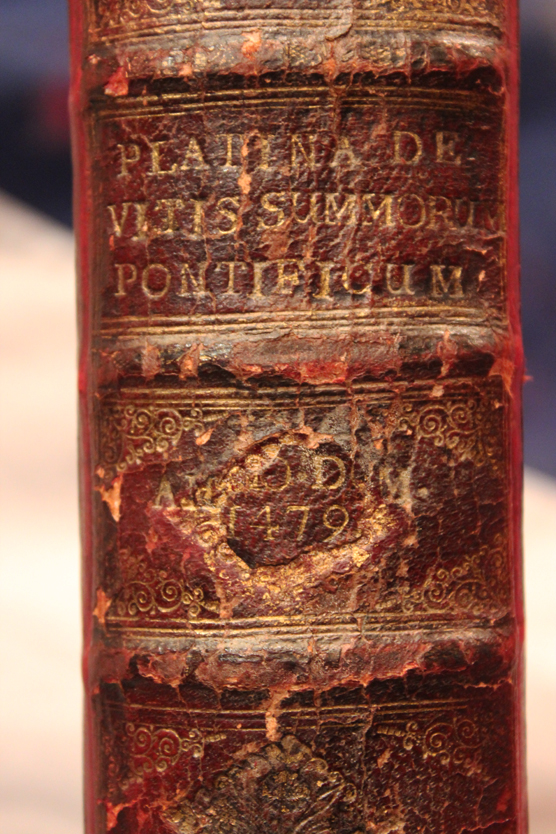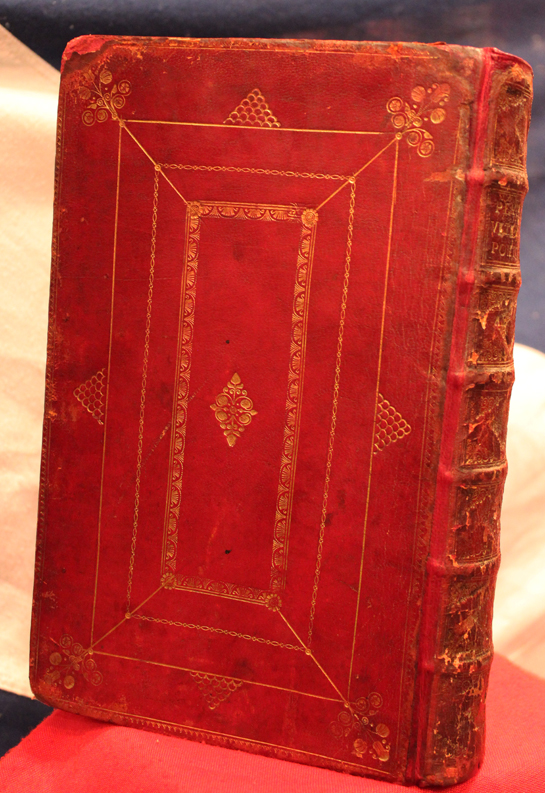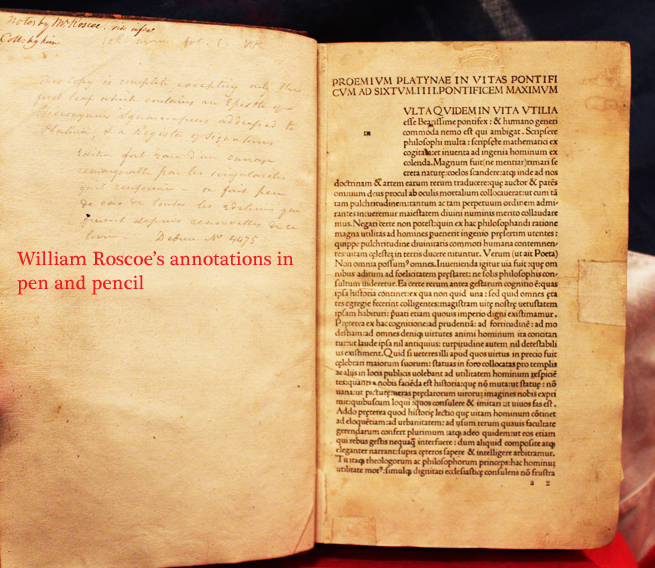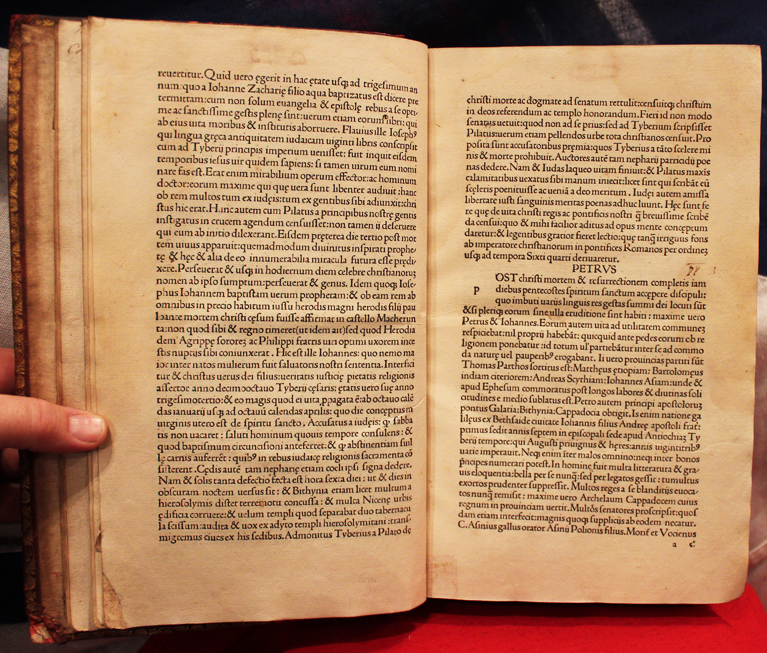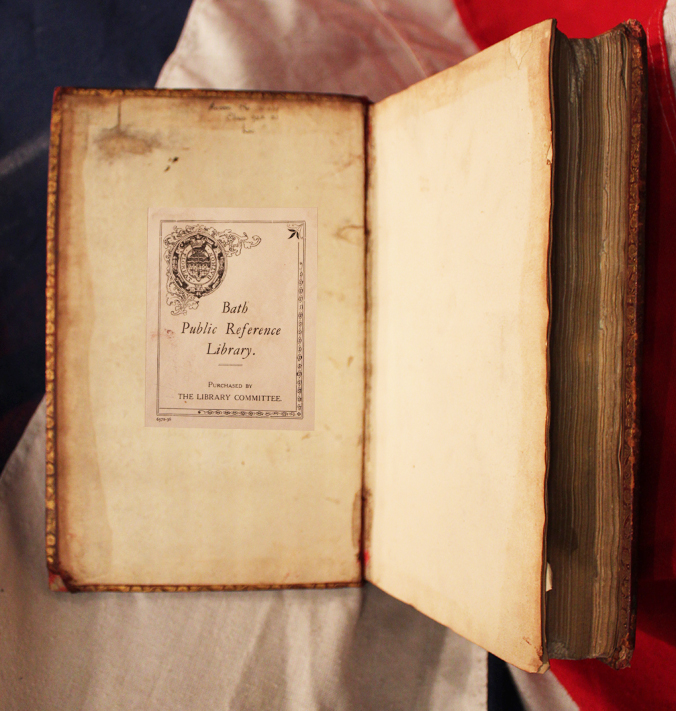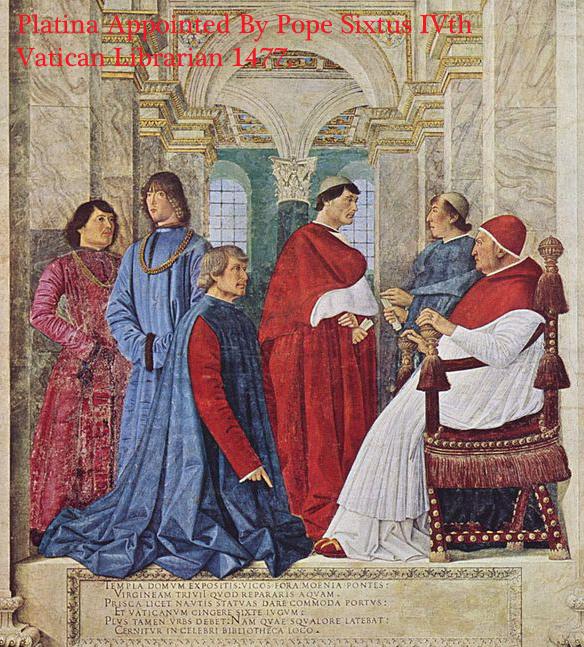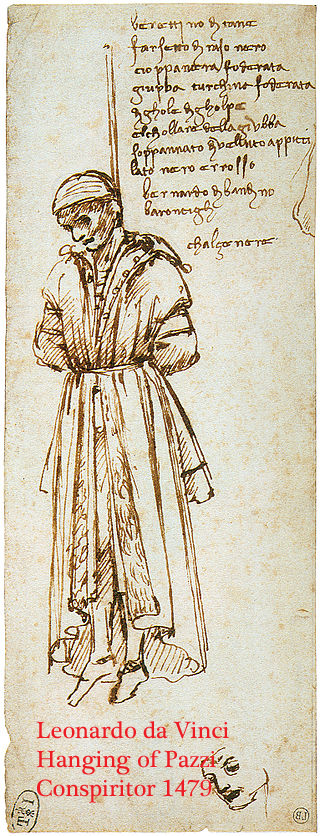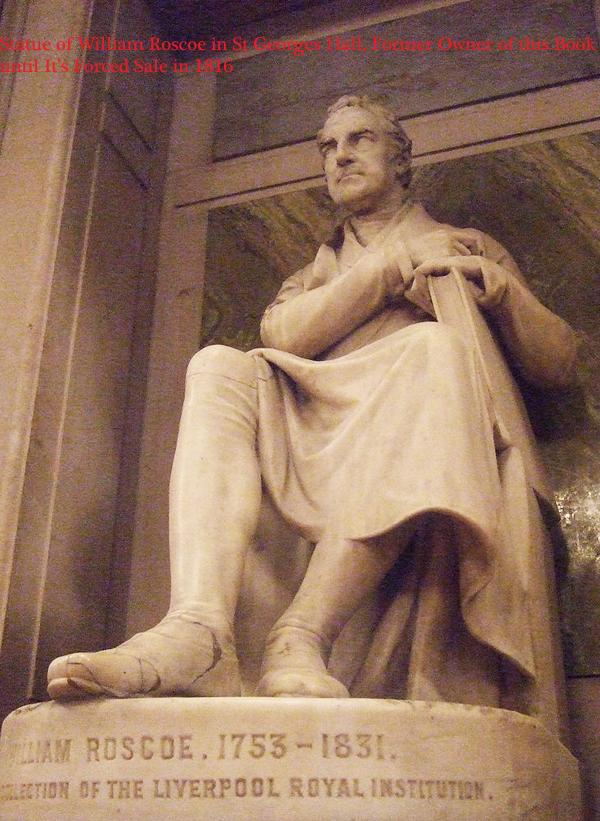A Very Rare, Original Medeavil Book, Classifield, Alongside The Gutenberg Bible, as An Incunabule,Titled, Vitae Pontificum, Ist Edition, of 1479, By Bartolomaeus Platina, Vitae Pontificum (Lives of the Popes) and Personally Presented It To Pope Sixtus IV
Only the second example of such an incunabule we have ever seen in almost 60 years. Written by Bartolomeo Sacchi, the Pope's personally appointed, very first prefect of the Vatican library known as the 'Vatican Librarian'. He was also the author of the very first printed cookbook, a wildly popular tract , entitled '
De honesta voluptate et valetudine'
(“On Respectable Pleasure and Good Health”).
It is believed by some gastronomic historians that it is from his cookbook that all the world's recipes of pasta originated, as it was the very first record of the staple Roman Italian diet.
As for his cookbook, it would go down as one of Sacchi’s most important literary contributions, if only because of the insight it provides into the dietary habits of Italians at the time. For one thing, it marks a fascinating stage in the evolution of the dish that is undoubtedly Italy’s best-loved and most widely imitated contribution to global food culture: Pasta with sauce.
Written by Pope Sixtus IVth's Appointed Vatican Librarian. This remarkable tome, an Incunabule, is over 547 years old. It may have been taken from the Vatican library during the Sack of Rome in 1527 by the Mutinous imperial Army, where, apart from wholesale murder and pillaging, millions of gold ducats worth of art was stolen or destroyed and much of the Vatican library looted and sold partly for ransom. The sack of Rome was so prolific and devastating, the population of Rome was diminished from 55,000 to less than 10,000. To understand, by comparison, this radical reduction of Rome's fortunes and population {once the very centre of the world's greatest empire} the City of Alexandria in Egypt, during the Ptolemaic era, 1,500 years before, had a population of between five hundred thousand to a million
Pope Sixtus IVth accomplishments as pope included the construction of the Sistine Chapel and the creation of the Vatican Library. A patron of the arts, he brought together the group of artists who ushered the early Renaissance into Rome with the first masterpieces of the city's new artistic age.
When Bartolomeo Sacchi ('Platina', 1421-1481) wrote this Vitae Pontificum (Lives of the Popes) and personally presented it to Pope Sixtus IV in 1475, he surely could not have imagined how influential it would become over the centuries. This volume by Platina was the first ever printed book on Papal history, the lives of the popes from the time of Jesus Christ, to the reign of Sixtus IV, composed as a humanist Latin narrative, and, as such, marked a distinct breakthrough in relation to the Liber Pontificalis, the standard medieval chronicle of the papacy.
Whatever Platina's intentions for the book that was published in 1479, it soon came to be regarded as the official history of the Roman pontiffs, an icon of the earliest printing.
This book was part of the conclusion of the infamous Pazzi conspiracy, which was was a failed plot in 1478 to overthrow the Medici family's rule in Florence, Italy. The Pazzi family, rivals of the Medici, alongside Pope Sixtus IV and others, aimed to assassinate Lorenzo and Giuliano de' Medici during a Mass in Florence Cathedral. While Giuliano was killed, Lorenzo survived with a wound. The failed coup triggered a brutal backlash against the conspirators.
The conspiracy involved the Pazzi family (Francesco and Jacopo Pazzi), Archbishop Francesco Salviati, and others, with backing from Pope Sixtus IV and his nephew Girolamo Riario.
The Pazzi family sought to regain political power and influence, which had been eclipsed by the Medici. Pope Sixtus IV was also motivated by a desire to expand papal power in the Romagna region, which Lorenzo de' Medici opposed.
The assassination attempt took place on April 26, 1478, during a Mass in Florence Cathedral.
Consequences:
The Pazzi family faced severe repercussions, including executions and banishment. The Medici family's power was solidified in Florence, demonstrating their strong political and financial resources.
The Pazzi conspiracy is a significant event in Florentine history, highlighting the intense power struggles and political machinations of the Italian Renaissance. It also underscores the Medici family's dominance and their ability to survive and even thrive after facing such a serious threat
This fabulous and rare book, an incunabula just as is the Gutenberg Bible, was formerly from the library of the renown Abolishionist William Roscoe, sold by him at auction in 1816 for £1.13/-, due to the financial difficulties of his banking house, and acquired by order of the Library Committee of the City of Bath Reference Library.
This book was likely commissioned due to the influences of Pope Sixtus IV Francesco della Rovere upon his librarian, it's author, Bartolomaeus Platina.
We show in the gallery a painting of Pope Sixtus appointing Platina as the official Vatican Librarian.
An Incunable is a most rarest of books, pamphlet, or broadside (such as the Almanach cracoviense ad annum 1474) that was printed, not handwritten, before the year 1501 in Europe.
They are the earliest form of printed books. Incunabula include the Gutenberg Bible of 1455, probably the most valuable book in the world. This is a First Edition of Bartholomaeus Platina's great history of the lives of the Popes, the first systematic papal history, not only to create the first detailed history of the Popes but also to villify his mortal enemy Pope Paul IInd Pietro Barbo. This book was created in the era of the great Rennaiscance, in the time of the notorious Borgias and in the year of the notorious Pazzi conspiracy, which was a plot by members of the Pazzi family and others to displace the de' Medici family as rulers of Renaissance Florence. It was printed at the time that Leonado De Vinci drew the hanging of a Pazzi conspiritor Bernardo di Bandino Baroncelli. On 26 April 1478 there was an attempt to assassinate Lorenzo de' Medici and his brother Giuliano de' Medici. Lorenzo was wounded but survived; Giuliano was killed. The failure of the plot served to strengthen the position of the de' Medici. The Pazzi were banished from Florence. During the time the Platina served as the first librarian at the Vatican under its modern founder, Sixtus IV. Platina started his career as a soldier employed by condottieri, before gaining long-term patronage from the Gonzagas, including the young cardinal Francesco, for whom he wrote a family history. He studied under the Byzantine humanist philosopher John Argyropulos in Florence, where he frequented other fellow humanists, as well as members of the ruling Medici family.
Around 1462 he moved with Francesco Gonzaga to Rome, where he purchased a post as a papal writer under the humanist Pius II (Enea Silvio Piccolomini) and became a member of the pagan-influenced Roman Academy founded by Pomponio Leto. Close acquaintance with the renowned chef Maestro Martino in Rome seems to have provided inspiration for a theoretical treatise on Italian gastronomy entitled De honesta voluptate et valetudine ("On honourable pleasure and health"), which achieved considerable popularity and has the distinction of being considered the first printed cookbook.
Platina's papal employment was abruptly curtailed on the arrival of an anti-humanist pope, Paul II (Pietro Barbo), who had the rebellious Platina locked up in Castel Sant'Angelo during the winter of 1464-65 as a punishment for his remonstrations. In 1468 he was again confined in Castel Sant'Angelo for a further year, where he was interrogated under torture, following accusations of an alleged pagan conspiracy by members of Pomponio's Roman academy involving plans to assassinate the pope.
Platina's fortunes were revived by the return to power of the strongly pro-humanist pope, Sixtus IV (Francesco della Rovere), who in 1475 made him Vatican librarian an appointment which was depicted in a famous fresco by Melozzo da Forli. He was granted the post after writing an innovative and influential history of the lives of the popes that gives ample space to Roman history and pagan themes, and concludes by vilifying Platina's nemesis, Paul Iia paragraph from Platina's Vitae Pontificum first gave rise to the legend of the excommunication of Halley's comet by Pope Callixtus III,
Vitae Pontificum ("Lives of the Popes", 1479) "Incunable" is the anglicised singular form of "incunabula", Latin for "swaddling clothes" or "cradle", which can refer to "the earliest stages or first traces in the development of anything." A former term for "incunable" is "fifteener", referring to the 15th century. Vitae pontificum, FIRST EDITION, 239 leaves (of 240, lacking first leaf), 39 lines, roman (and a little Greek) letter, capital spaces with guide letters, a few early marginal ink annotations, tears repaired to 2 leaves, small worm trace in upper margin of approximately 30 leaves (touching letters on approximately 20), inner margins of final leaves strengthened at gutter margins and a few other small paper repairs, gnawing to some fore-corners, blindstamp on approximately 6 leaves, late seventeenth/early eighteenth century red morocco gilt, sides panelled with corner, side and central decorations, spine gilt-tooled (including title and publication date) in 7 compartments within raised bands, rebacked preserving most of original spine. Venice, Johannes de Colonia and Johannes Manthen, 11 June 1479. William Roscoe's copy of the first editon of Platina's history of the Popes.
Provenance: William Roscoe (1753-1832), historian and author of Lorenzo de Medici (1796) and The Life of Pope Leo X (1805), with a 10-line pencil note in his hand, above which an ink note reads "Notes by Wm. Roscoe vide infra. Coll. By him". One of this books former owners was the renown William Roscoe (8 March 1753 , 30 June 1831). He was an English historian, leading abolitionist, art collector, M.P. Lawyer, banker, botanist and miscellaneous writer, perhaps best known today as an early abolitionist. 11.25 inches x 7.5inches x 2.25 inches.
Code: 20006
6950.00 GBP


